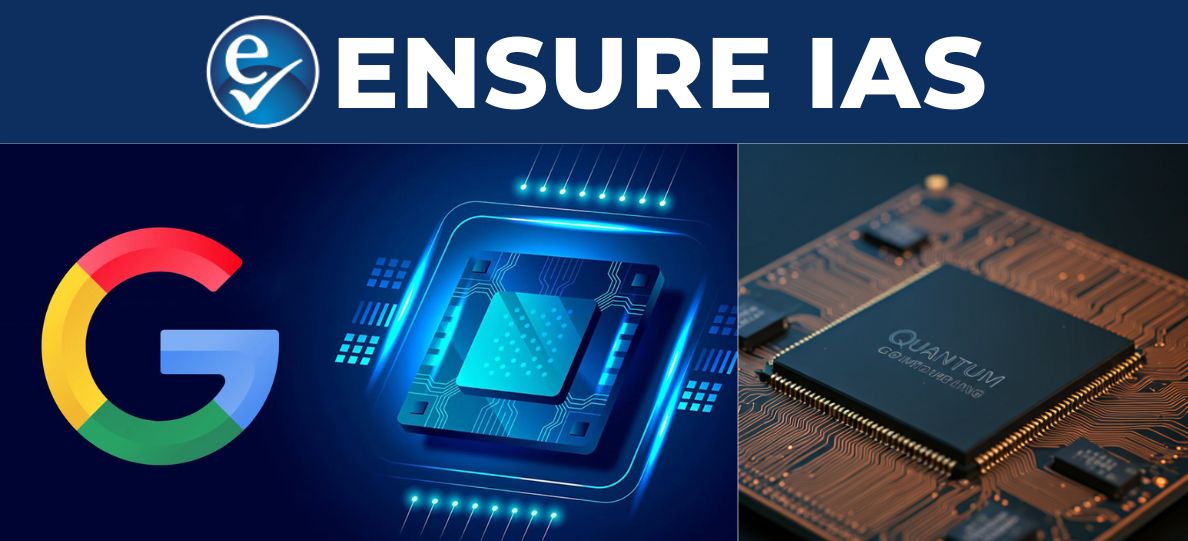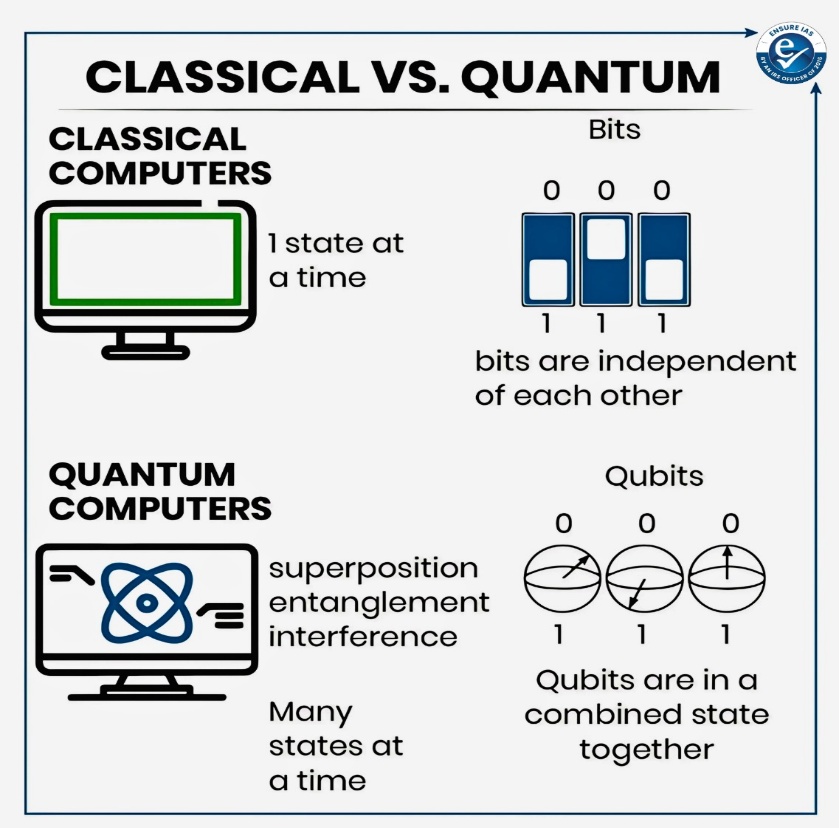- Courses
- GS Full Course 1 Year
- GS Full Course 2 Year
- GS Full Course 3 Year
- GS Full Course Till Selection
- Online Program
- GS Recorded Course
- NCERT (Recorded 500+ Hours)
- Polity Recorded Course
- Geography Recorded Course
- Economy Recorded Course
- AMAC Recorded Course
- Modern India, Post Independence & World History
- Environment Recoded Course
- Governance Recoded Course
- Science & Tech. Recoded Course
- International Relations and Internal Security Recorded Course
- Disaster Management Module Course
- Ethics Recoded Course
- Essay Recoded Course
- Current Affairs Recoded Course
- CSAT
- 5 LAYERED ARJUNA Mentorship
- Public Administration Optional
- ABOUT US
- OUR TOPPERS
- TEST SERIES
- FREE STUDY MATERIAL
- VIDEOS
- CONTACT US
Google’s Latest Quantum Chip: Willow
Google’s Latest Quantum Chip: Willow

- Google has recently unveiled Willow, its latest quantum chip, marking an important advancement in the field of quantum computing.
- Willow represents a significant step forward in solving some of the challenges that have plagued quantum computers, particularly around error reduction and quantum coherence.
Key Achievements of Willow
- Improved Performance on RCS Benchmark: Willow has demonstrated exceptional performance in the Random Circuit Sampling (RCS) benchmark, a key test used in quantum computing.
- Exponential Error Reduction: As quantum systems scale up with more qubits, Willow can reduce errors exponentially, an important factor for building larger and more reliable quantum computers.
- Speed Advantage: Willow performed a benchmark computation in under five minutes, a task that would take 10 septillion (10^25) years on today’s fastest supercomputers.
- Improved Coherence Time: Willow has also shown better coherence time, which refers to the amount of time a qubit can maintain its quantum state before it collapses.
Understanding Quantum Chips and Qubits
1. Qubits vs. Classical Bits:
- Classical Bits: Traditional computer chips use bits that represent information as either a 0 or a 1.
- Quantum Bits (Qubits): Quantum chips, however, use qubits which can exist not only in a 0 or 1 state but also in a superposition of states, where they can represent multiple states simultaneously. This enables quantum computers to perform computations much faster and more efficiently than classical computers.
2. Superposition and Entanglement:
- Superposition: A qubit can represent not just 0 or 1, but a combination of both states, expanding its potential for calculation.
- Entanglement: Qubits can also be entangled, meaning the state of one qubit can depend on the state of another, even if they are far apart. This phenomenon allows quantum computers to process information in ways classical computers cannot.
- Quantum Gates: Just like classical computers perform operations on bits through logical gates (AND, OR, NOT), quantum computers use quantum gates to manipulate qubits and perform calculations. These operations are crucial to quantum computation, but they behave differently from classical gates.
Impact of Quantum Computing on Emerging Technologies
1. Quantum AI:
- Quantum computers can process data much faster than classical systems, making them a great asset in the development of Quantum AI.
- This technology can revolutionize how AI algorithms are trained, especially when dealing with large datasets, leading to more advanced AI models.
2. Encryption and Cybersecurity:
- RSA Encryption: One of the biggest concerns with quantum computing is its potential to break current encryption systems.
- For example, quantum computers could break RSA encryption, which is widely used for securing online communications.
- Shor’s Algorithm: In 1994, Peter Shor showed that a sufficiently powerful quantum computer could solve the discrete logarithm problem, breaking RSA encryption. This poses a challenge to cybersecurity and could change the landscape of digital security.
3. Cryptocurrency:
- Impact on Cryptocurrencies: The ability of quantum computers to break encryption algorithms threatens the security of cryptocurrencies like Bitcoin, which rely on cryptography to secure transactions and protect user data.

Challenges Facing Quantum Computing
1. Fragile Quantum States:
- Qubits are highly sensitive to their environment, and even slight disturbances can cause them to lose their quantum state.
- This fragility limits how long qubits can store information, which in turn limits the scalability of quantum systems.
2. Noise and Interference:
- Qubits are vulnerable to noise and interference, which can cause them to lose information.
- Even with large numbers of qubits, many might end up being redundant due to these issues, making quantum systems inefficient.
3. Temperature Control: Quantum systems need to be kept at near absolute zero temperatures to maintain stability and prevent disturbances. This requires complex and costly cooling systems.
4. High Costs: Building and maintaining quantum systems requires expensive equipment, including coaxial cables, CMOS control systems, and sophisticated cooling mechanisms, making it challenging to scale quantum computing for practical business needs.
5. Supply Chain Issues: Quantum chip production relies on highly specialized materials and equipment, and global disruptions (like pandemics or trade wars) can lead to delays or shortages in the supply chain.
Way Ahead for Quantum Computing
1. Research and Materials:
- Advancing quantum computing will require research into semiconducting materials like silicon, gallium, and germanium.
- These materials could lead to more efficient qubits and better-performing quantum chips.
- Global Collaboration: To accelerate progress, global collaboration is vital. Initiatives such as the Quad Critical and Emerging Technology Working Group and Quantum Centers of Excellence are pushing for cooperation and sharing knowledge in the quantum field.
2. Investment and Policy:
- To overcome the challenges in quantum computing, increased investment and the development of clear policies and regulations are crucial.
- This will help guide the ethical and responsible use of quantum technologies.
- Talent Development: Building a workforce proficient in quantum theory, physics, and computer science is essential for pushing the boundaries of what quantum computing can achieve.
Willow represents a significant leap forward in quantum computing. While challenges remain—such as qubit fragility, noise interference, and high costs—ongoing advancements in quantum theory and technology, along with global collaboration and increased investment, offer hope for a future where quantum computers can solve problems beyond the reach of today’s classical systems. For aspiring quantum computing experts, this is an exciting time to get involved in this cutting-edge field!
|
Also Read |
|
| Public Administration Optional | |
| UPSC Monthly Magazine | Question Answer Practice For UPSC |



